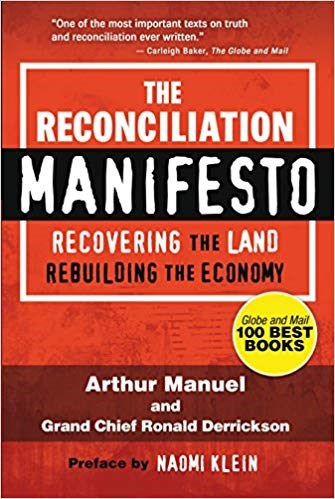“How do we get rid of colonialism,” asks Arthur Manuel in his powerful book, The Reconciliation Manifesto, “and how do we live together afterward?”
Manuel, a widely respected Indigenous leader of the Secwepemc Nation in B.C. insists the answer is simple: “Canada needs to fully recognize our Aboriginal and treaty rights and our Aboriginal right to self-determination. At the same time, we will recognize the fundamental human right of Canadians, after hundreds of years of settlement, to live here.”
Then, he writes, we sit down together and negotiate how we can all live and prosper on this land “in a way that protects the environment for all generations.”
The Reconciliation Manifesto, first published in 2017, the same year as Manuel’s death, is one of the most important texts on truth and reconciliation, a crucial read for all people interested in social and economic justice. With clear prose and great humour, he challenges almost every belief non-Indigenous Canadians have about their relationship with Indigenous peoples, and offers us the steps needed to make this relationship healthy and honourable. His vast knowledge and experience, his straightforward explanations of complex legal decisions and his love for his family and the land make this a compelling read and a call to action.
With wit and clarity, he takes us through Canada’s constitutional history, beginning with the British North America Act in 1867, which gave the federal government complete power over “Indians” and the land reserved for them.
Manuel apologizes for taking readers into the “legal swamp,” but insists on the necessity of understanding of how the Canadian legal system works. He describes the impact of recent Supreme Court of Canada decisions that have consistently decided in favour of Indigenous rights, from the landmark Delgamuukw decision of 1997 through to the Tsilqot’in Nation v. British Columbia decision of 2014, “which picked up where Delgamuukw left off with the first ever declaration of Aboriginal title on the ground in Canadian history.” At the same time, Manuel relates how the federal government continues to ignore these decisions, sharing details of his own battles with the Canadian government.
Manuel demonstrates how the poverty of Indigenous people is the direct result of settlers living on Native land and taking almost 100 per cent of the profits from natural wealth and resources.
“Our dependency was not some accident of history. It is at the heart of the colonial system,” he writes. “The brilliance of the Canadian system as it has evolved is that today our poverty and misery is actually administered by our own people.”
The Reconciliation Manifesto is a guide for all those who would be allies to Indigenous peoples.
You are invited to join the Knowing Our Place Book Club to discuss the book on March 23 and April 27 from 11 a.m. to 12:30 p.m.
Knowing Our Place is brought to you by the Bowen Island Library, the Bowen Island Arts Council and Pauline Le Bel. Books will be available from the Bowen Library. Please register at bit.ly/bookclub2019-2. For more information contact [email protected]or [email protected].



